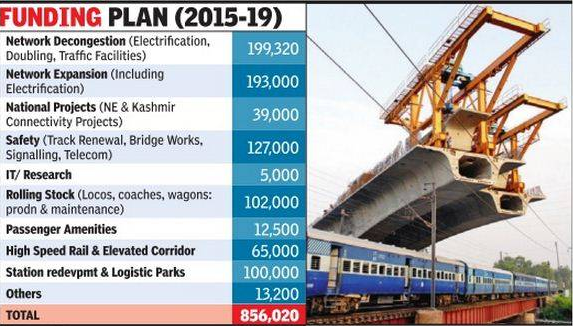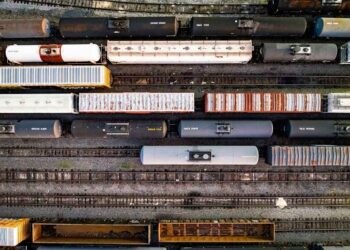Though he resisted the temptation to an nounce projects in his budget speech, railways minister Suresh Prabhu sanctioned 77 new projects covering 9,400 km of doubling, tripling, quadrupling works along with their electrification at a total cost of Rs 96,182 crore, aimed at improving capacity on existing high-density routes.
The minister also assured MPs that all states have been taken care of in finalizing these projects following a recommendation of a designated committee for capacity enhancement, revenue generation and decongestion.
While saying that negotiations are on with financial institutions for funding of these projects, Prabhu said these projects are low-hanging fruit and returns are higher. As a result it will result in quick improvement on the ground.
Prabhu said he intended to fast track the already sanctioned works on 7,000 km of Figures in crore double, third, fourth lines and commission 1,200 km in 2015-16 at an investment of Rs 8,686 crore. “Our high-density networks are congested, over-strained and capacity constrained. Our customers are dissatisfied.
Our key customers like the coal, steel, and cement industries need new lines to transport their wares,” he said. “Decongesting these networks with a basket of traffic generating projects is a priority,” he added.
The budget allocated Rs 2,374 crore for 2015-16 for traffic facility works like construction of longer loops, creating smaller block sections, building by-pass lines, making crossing stations, augmenting terminals and re moving permanent speed restrictions. “These are small expenditure works but they provide huge operating benefits in a short time to debottleneck and create additional capacity,” he said.
The minister has set an ambitious target of increasing daily passenger carrying capacity from 21 million to 30 million, increase in track length by 20% from 1,14,000 kms to 1,38,000 km and growth of annual freight carrying capacity from 1 billion to 1.5 billion tonnes.
Announcing the beginning of a five-year action plan to transform railways, Prabhu said that Rs 8.5 lakh crore will be invested in railways. He earmarked Rs 1,99,320 crore for network decogestion, including the Dedicated Freight Corridor and electrification, Rs 1,93,000 crore for network expansion, Rs 39,000 crore for national projects (North Eastern and Kashmir connectivity projects) and Rs 1,27,000 for safety (track renewal, bridge works, road overbridge, road underbridge, and signalling and telecom).
Under his plan, Prabhu allocated Rs 5,000 crore for information technology and, research and Rs 1,02,000 crore for rolling stock (locomotives, coaches, wagons production and maintenance), Rs 12,500 crore for passenger amenities, Rs 65,000 crore for high-speed rail and elevated corridor, Rs 1,00,000 crore for station redevelopment and logistic parks.
Fares unchanged despite diesel prices tanking
Railway minister Suresh R Prabhu on Thursday left rail ares unchanged despite a fall in iesel prices, arguing that fuel ost had actually gone up due to rise in electricity costs. For the ast few years, the Centre has oved to a flexible fare policy ith periodic adjustments for hanges in fuel prices. As a esult, fares had gone up when il prices were rising. With crude rices now lower, there was xpectation of a dip in fares as ell. Officials, however, defend d the status quo, arguing that ares are in any case subsidized nd the railways depends on reight to make up for the losses ue to sale of tickets much below he actual cost. Rail budget ocuments show that fuel cost in 014-15 is now estimated to be round Rs 5,000 crore lower han the budget estimate.
gainst the original projection of round Rs 35,200 crore, Prabhu as now revised the number to round Rs 30,200 crore. In fact, or 2015-16, he has budgeted or a marginal increase of around s 100 crore.

































